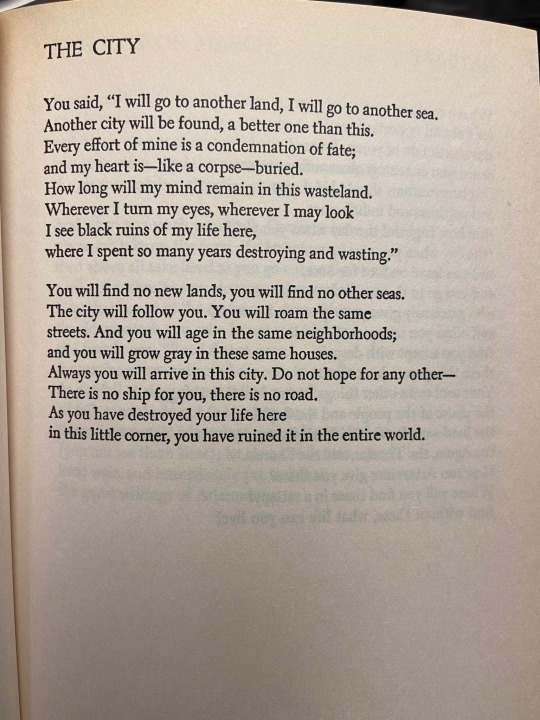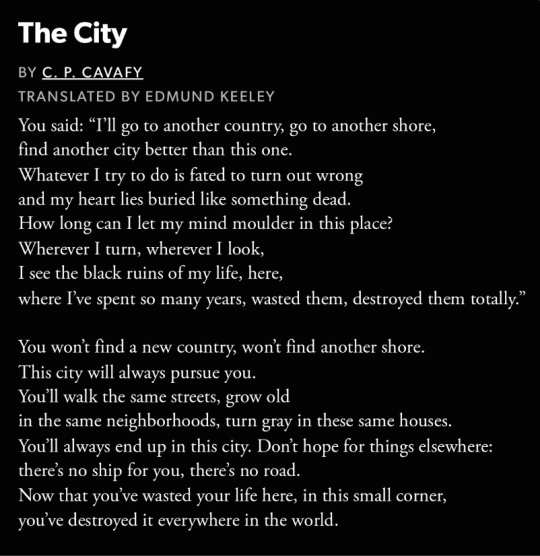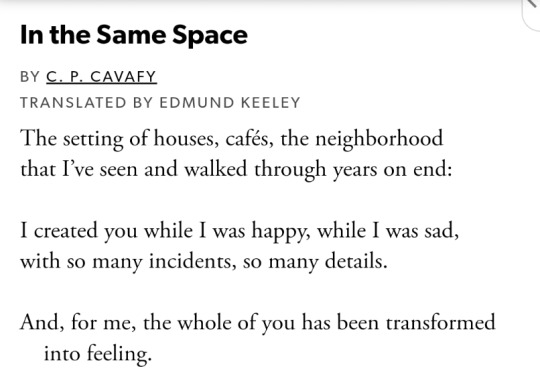#cavafy
Text
Body, remember not only how much you were loved,
not only the beds on which you lay,
but also those desires which for you
plainly glowed in the eyes,
and trembled in the voice -- and some
chance obstacle made them futile.
Now that all belongs to the past,
it is almost as if you had yielded
to those desires too -- remember,
how they glowed, in the eyes looking at you;
how they trembled in the voice, for you, remember, body.
-Constantine P. Cavafy
33 notes
·
View notes
Text
bir anın, yalnızca bir anın bütün bir hayatı kapladığı anlar… bir an… belki sadece andan ibaret olan bir an. geçirdiğimiz binlerce saniyenin içinden bir şekilde zihnimizin içine sinsice sızmış ve orada bağımsızlığını ilan etmiş bir an.
murathan mungan - yalnız bir opera
#kitap#edebiyat#blogger#felsefe#kitaplar#blog#kitap kurdu#charles bukowski#joachim murat#yalnız bir opera#yaz geçer#vazoda tozlu güller#didem madak#lale müldür#yılmaz güney#ümit yaşar oğuzcan#milan kundera#franz kafka#jorge luis borges#yannis ritsos#konstantin kavafis#cavafy#oscar wilde#orhan pamuk#ahmet altan#beyaz geceler#elif şafak#birhan keskin#sabahattin ali#kürk mantolu madonna
15 notes
·
View notes
Text

In Despair, Constantine P. Cavafy
[text ID: He's lost him utterly, as if he'd never been. / In his imagination, in his hallucinations / in the lips of other youths he seeks the lips of that one; / He wishes that he might feel his love again.]
#c.p. cavafy#constantine p. cavafy#cavafy#poetry#poet#poem#quote#lgbt#classic literature#classical literature#literature#greek#translated#quotes#fragment#excerpt#lit#my post
203 notes
·
View notes
Photo


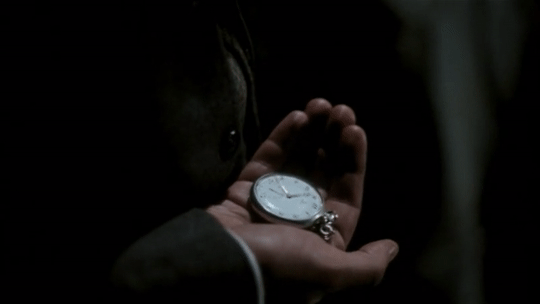



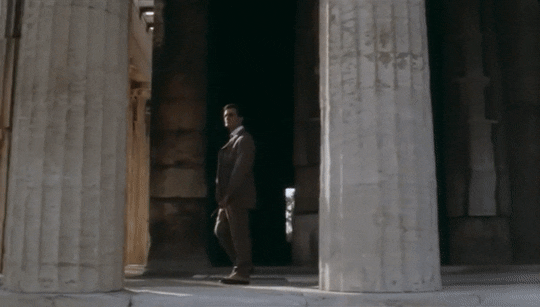



ΚΑΒΆΦΗΣ | KAVAFIS (1996)
dir. Yannis Smaragdis
Alexandria, Kingdom of Egypt, 1933. Intent on publishing a study on the life and work of a prominent intellectual, a young biographer visits bedridden Konstantinos Kavafis: a Greek poet, journalist, and civil servant from Alexandria. On his 70th birthday, the gravely ill thinker skims through his biography to give his approval, and as he takes a trip down memory lane, little by little, Kavafis relives the pivotal events that shaped his life.
(link in title)
#drive link#lgbt cinema#gay cinema#kavafis#cavafy#kavafis 1996#greek cinema#lgbt#gay#greece#lgbt movie#gay movies#greek movie#lgbt film#gay film#greek film#constantin cavafis#c p cavafy#lgbt media#gay media#queer cinema#european cinema#dimitris katalifos#vasilis diamantopoulos#lazaros georgakopoulos#1990s#1990s cinema#1990s movies#1990s films#90s films
82 notes
·
View notes
Photo
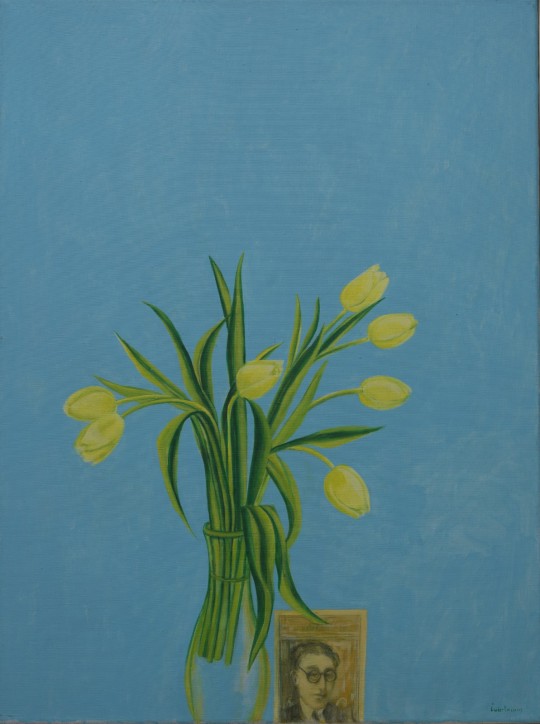
Wojciech Ćwiertniewicz, A Presentation of Love, 1983, 80x60, acrylic on canvas
38 notes
·
View notes
Photo


Rereading Cavafy
127 notes
·
View notes
Text
As you set out for Ithaka
hope your road is a long one,
full of adventure, full of discovery.
Laistrygonians, Cyclops,
angry Poseidon—don’t be afraid of them:
you’ll never find things like that on your way
as long as you keep your thoughts raised high,
as long as a rare excitement
stirs your spirit and your body.
Laistrygonians, Cyclops,
wild Poseidon—you won’t encounter them
unless you bring them along inside your soul,
unless your soul sets them up in front of you.
Hope your road is a long one.
May there be many summer mornings when,
with what pleasure, what joy,
you enter harbors you’re seeing for the first time;
may you stop at Phoenician trading stations
to buy fine things,
mother of pearl and coral, amber and ebony,
sensual perfume of every kind—
as many sensual perfumes as you can;
and may you visit many Egyptian cities
to learn and go on learning from their scholars.
Keep Ithaka always in your mind.
Arriving there is what you’re destined for.
But don’t hurry the journey at all.
Better if it lasts for years,
so you’re old by the time you reach the island,
wealthy with all you’ve gained on the way,
not expecting Ithaka to make you rich.
Ithaka gave you the marvelous journey.
Without her you wouldn't have set out.
She has nothing left to give you now.
And if you find her poor, Ithaka won’t have fooled you.
Wise as you will have become, so full of experience,
you’ll have understood by then what these Ithakas mean.
-
BY C. P. CAVAFY
TRANSLATED BY EDMUND KEELEY
7 notes
·
View notes
Text
Now what’s going to happen to us without barbarians?
Those people were a kind of solution.
C. P. Cavafy, 'Waiting for the Barbarians' (Trans. Keeley and Sherrard)
22 notes
·
View notes
Text
Returning from Greece
Well, we’re nearly there, Hermippos.
Day after tomorrow, it seems—that’s what the captain said.
At least we’re sailing our seas,
the waters of Cyprus, Syria, and Egypt,
the beloved waters of our home countries.
Why so silent? Ask your heart:
didn’t you too feel happier
the farther we got from Greece?
What’s the point of fooling ourselves?
That would hardly be properly Greek.
It’s time we admitted the truth:
we are Greeks also—what else are we?—
but with Asiatic affections and feelings,
affections and feelings
sometimes alien to Hellenism.
It isn’t right, Hermippos, for us philosophers
to be like some of our petty kings
(remember how we laughed at them
when they used to come to our lectures?)
who through their showy Hellenified exteriors,
Macedonian exteriors (naturally),
let a bit of Arabia peep out now and then,
a bit of Media they can’t keep back.
And to what laughable lengths the fools went
trying to cover it up!
No, that’s not at all right for us.
For Greeks like us that kind of pettiness won’t do.
We must not be ashamed
of the Syrian and Egyptian blood in our veins;
we should really honor it, take pride in it.
(Translated from the Greek by Edmund Keeley and Philip Sherrard)
#poetry#Konstantinos Kavafis#Constantine Cavafy#C.P. Cavafy#Cavafy#Greek poetry#Edmund Keeley#Philip Sherrard#Greece#home#alienation#homesickness#Syria#Egypt#Alexandria#Cyprus#assimilation#immigration#unease#cultural diversity#cultural alienation#immigrant songs
4 notes
·
View notes
Text
bir gemi yok, bir yol yok sana
kavafis - selected poems
#kavafis#konstantin kavafis#cavafy#selected poems#seçilmiş şiirler#şiir blog#şiir#arthur schopenhauer#arthur rimbaud#charles bukowski#jean paul sartre#bulantı#albert camus#düşüş#felsefe blog#kitap#edebiyat#blogger#felsefe#kitaplar#blog#kitap kurdu#friedrich nietzsche#küçük prens#herman hesse#samuel beckett#oblomov#dostoyevski#poems#poetry
15 notes
·
View notes
Text
"Poetics of Fragmentation in the Athyr Poem of C. P. Cavafy
Gregory Nagy
[Originally published in Imagination and Logos: Essays on C. P. Cavafy (ed. Panagiotis Roilos) 265-272. Cambridge, MA 2010. The original pagination of the article will be indicated in this electronic version by way of curly brackets (“{“ and “}”). For example, “{265|266}” indicates where p. 265 of the printed article ends and p. 266 begins.]
Ἐν τῷ μη[νὶ] Ἀθύρ
[[1]] Μὲ δυσκολία διαβάζω στὴν πέτρα τὴν ἀρχαία.
[[2]] <<Κύ[ρι]ε Ἰησοῦ Χριστέ>>. Ἕνα <<Ψυ[χ]ὴν>> διακρίνω.
[[3]] <<Ἐν τῷ μη[νὶ] Ἀθὺρ>> <<ὁ Λεύκιο[ς] ἐ[κοιμ]ήθη>>.
[[4]] Στὴ μνεία τῆς ἡλικίας <<Ἐβί[ωσ]εν ἐτῶν>>,
[[5]] τὸ Κάππα Ζῆτα δείχνει ποὺ νέος ἐκοιμήθη.
[[6]] Μὲς στὰ φθαρμένα βλέπω <<Αὐτὸ[ν] … Ἀλεξανδρέα>>.
[[7]] Μετὰ ἔχει τρεῖς γραμμὲς πολὺ ἀκρωτηριασμένες·
[[8]] μὰ κάτι λέξεις βγάζω – σὰν <<δ[ά]κρυα ἡμῶν>>, <<ὀδύνην>>,
[[9]] κατόπιν πάλι <<δάκρυα>>, καὶ <<[ἡμ]ῖν τοῖς [φ]ίλοις πένθος>>.
[[10]] Μὲ φαίνεται ποὺ ὁ Λεύκιος μεγάλως θ’ ἀγαπήθη.
[[11]] Ἐν τῷ μηνὶ Ἀθὺρ ὁ Λεύκιος ἐκοιμήθη.
It is hard to read . . . . on the ancient stone.
“Lord Jesus Christ” . . . . I make out the word “Soul”.
“In the month of Athyr . . . . Lucius fell asleep.”
His age is mentioned . . . . “He lived years . . . .”?
The letters KZ show . . . . that he fell asleep young.
In the damaged part I see the words . . . . “Him . . Alexandrian.”
Then come three lines . . . . much mutilated.
But I can read a few words . . . . perhaps “our tears” and “sorrows.”
And again: “Tears” . . . . and: “for us his friend mourning.”
I think Lucius . . . . was much beloved.
In the month of Athyr . . . . Lucius fell asleep . . . .
Translated by George Valassopoulo in E.M. Forster, Pharos and Pharillon, Hogarth Press, 1923 from C. P. Cavafy, Poems 1916-18 as published on the Official Website of the Cavafy Archive, http://www.cavafy.com/
My contribution, however slight, to an understanding of this difficult poem starts with an alternative translation of my own, followed by an exegesis. My translation has no literary merit: it is simply a working translation, keyed to the exegesis that follows it. In order to facilitate the reading of the exegesis, I have numbered, within double-square brackets ([[ ]]), the lines of the translation to match the verses of Cavafy as printed in their original format. As we will see, even the formatting of this poem is part of its meaning. Here, then, is my translation of the poem—and of its formatting:
[[1]] “With difficulty, I am reading … what is on the ancient stone.
[[2]] It starts <<Lord Jesus Christ …>> Then there is another word, <<psyche>>, I can make out that much.
[[3]] <<In the month Athyr …>> <<… Lucius went to sleep>>.
[[4]] In remembrance of his age … <<He lived for such-and-such number of years>>
[[5]] —the letters <<Kappa>> and <<Zeta>>, for twenty and seven, show … that he was a youth when he went to sleep. {265|266}
[[6]] Right in the middle of the damaged parts, I see <<… himself … the Alexandrian>>.
[[7]] Then there are three lines that are … very much dismembered,
[[8]] but I can somehow make out some words … like, <<our tears>>, <<pain>>,
[[9]] then once again <<tears>>, … and, <<for us his friends, sorrow>>.
[[10]] It seems to me that Lucius … would have been very much loved.
[[11]] In the month Athyr … Lucius went to sleep.”
What follows is my exegesis, pursued line by line. In this exegesis, double quotation marks enclose wording xxx spoken by the poet who is reading an inscription in his poem: so, “xxx”. Double angular brackets enclose wording pictured as seen by the poet in the act of reading the inscription: so, <<xxx>>. And single quotation marks enclose wording that I use to translate Greek wording that falls outside the poem: so, ‘xxx’.
I start with the first comma, “,” at line [[1]] of my translation of the poem. With the placement of this comma “,” I mean to convey a double meaning inherent in the poem. That is, there are two levels of difficulty in this poem. One, it is difficult to read the fragmentary inscription engraved into stone. And two, it is difficult to read the poem. Not only is the fragmentary inscription difficult to read; even the act of reading the poem is difficult in the first place. For us as readers, it is as difficult to read the fragmentary poem as it is difficult for the poet to read the fragmentary inscription. That is because the reader of the fragmentary inscription, who is the poet of the poem that pictures the inscription, is implying that all poems are fragmentary inscriptions. Even more, the poet is implying that any act of reading anything is difficult: “With difficulty, I am reading.”
At line [[2]], the first three words of the fragmentary inscription seem at first to be easy enough to read. <<Κύ[ρι]ε Ἰησοῦ Χριστέ>> or <<Lord Jesus Christ>>… So far, so good. Maybe the reading will not be so difficult after all. Some letters have broken off, yes, but they can be restored without too much difficulty by the reader poet, who is following here the convention of experts in the heuristic science of epigraphy, making restorations of missing letters xxx by enclosing the letters of their restoration within square brackets: so, [xxx].
But now the real difficulties begin. Now the reader poet is starting to have a difficult time reading the next word at line [[2]], as the inscription becomes more and more fragmented. The reader thinks he can still make out the word <<Ψυ[χ]ήν>>, which translators tend to render as <<Soul>>, but the letter <<χ>>, which is also the first letter of <<Χ>>ριστός or <<Ch>>rist, has broken off, and it can only be restored within square brackets, just as experts in epigraphy restore missing letters within square brackets. Now, on second thought, the {266|267} reader is made more aware that the <<Lord>> of <<Lord Jesus Christ>> as read earlier at line [[2]] is also fragmented. There the missing letters are <<ρι>> in <<Κύ[ρι]ε>>, but those missing letters had been easily restored, also within square brackets, by the reader poet reading as an expert in epigraphy.
There is more to be said about the word <<Ψυ[χ]ήν>> as read by the reader poet at line [[2]]. This word, which is conventionally rendered as <<Soul>>, has been left untranslated in my working translation, where I give simply <<psyche>>. I do so because the translation ‘soul’ for ψυχή works only if the Christian sense of ψυχή is meant. But what if a pre-Christian sense is also meant here? In the Greek of Homeric diction, for example, ψυχή can refer either to the breath of life, when someone is alive, or to a disembodied simulacrum of identity after death, when someone is dead. And, by contrast with ψυχή, the word αὐτός in Homeric diction means not only ‘self’ when someone is alive but also ‘body’ when someone is dead. We see such a contrast between the words ψυχή and αὐτός at the very beginning of the Iliad:
Μῆνιν ἄειδε θεὰ Πηληϊάδεω Ἀχιλῆος
οὐλομένην, ἣ μυρί’ Ἀχαιοῖς ἄλγε’ ἔθηκε,
πολλὰς δ’ ἰφθίμους ψυχὰς Ἄϊδι προΐαψεν
ἡρώων, αὐτοὺς δὲ ἑλώρια τεῦχε κύνεσσιν
οἰωνοῖσί τε π���σι, Διὸς δ’ ��τελείετο βουλή
Anger, sing it, goddess! The anger of the son of Peleus, Achilles,
the baneful anger that caused countless pains for the Achaeans
and hurled to Hades many powerful psychai
of heroes, but they themselves [autoi, = their bodies] were made prizes for dogs
and for all kinds of birds. And the will of Zeus was being accomplished.
Iliad I 1-5
The Homeric body, as expressed by αὐτός or ‘self’, is still the self even after death, while the Homeric ψυχή after death is no longer the self but merely a disembodied simulacrum of the self. It is the ψυχαί or disembodied simulacra of the self who are being hurled down to Hades, not their bodies, who are the ‘selves’ themselves, the αὐτοί.
So then the question is, does the <<Αὐτόν>> or <<himself>> in the accusative case, as we read this word later on at line [[6]] in the poem of Cavafy, refer to the <<Alexandrian>> at the same line [[6]] in the Christian sense of the ‘self’ as a ψυχή that transcends death—or to the ‘self’ in the Homeric sense of a body left {267|268} behind by the ψυχή after death? At line [[2]] of the poem by Cavafy, the word <<Ψυχήν>> is also in the accusative case, just as the <<Αὐτόν>> or <<himself>> is in the accusative case at line [[6]]. Something is happening to the psyche, is being done to the psyche—whether this psyche is a Christian or a pre-Christian ψυχή.
At line [[3]], the reading continues, but we do not find out what happened to the psyche. All we can find out so far is that whatever did happen happened <<in the month of Athyr>>. That is what the inscription says in the first part of the line. In the second part, which is separated from the first part by a break in the line, the inscription goes on to say that a young man <<went to sleep>>, and we learn that his name was <<Lucius>>>. I translate the break between the first part and the second part of the line not with three dots marking ellipsis but with two sets of three dots marking two separate ellipses. That is because the break comes in the middle of a quotation, and there is no way of knowing whether the missing words are part of one syntactical sequence or of two.
The fragmentary inscription, as imagined at line [[3]], does not say outright that the young man <<went to sleep>>, since the root of the verb that I translate as <<went to sleep>>, <<κοιμ->>, is imagined as a learned epigraphical restoration. In the inscription, the root <<κοιμ->> has broken away and has to be restored within square brackets: <<ὁ Λεύκιο[ς] ἐ[κοιμ]ήθη>>, which can be approximated as <<Lucius [went to sleep]>>. The experience of going to sleep is epigraphically conjectured, without being poetically realized. At line [[5]] and then again at line [[11]], by contrast, the epigraphical conjecture will become a poetic reality. In those two lines, [[5]] and [[11]], the experience of going to sleep is a reality created by the poetry, no longer a conjecture derived from the heuristic science of epigraphy.
At line [[4]], the remembrance of the age of the young man Lucius anticipates a certainty—that the number of years he lived is known to the reader poet—who anticipates what is already known by the writer of the inscription. But the number is missing in this line, where the reader would expect to read it. That is why I translate here at line [[4]] the missing number by using the words <<such-and-such>>. What line [[4]] says is that <<He lived for such-and-such number of years>>. Line [[5]], which comes next, will fill in, adding the numbers that are expected but not yet found at line [[4]]. The <<such-and-such>> number of years at line [[4] can finally be filled in with real numbers at line [[5]], but only because the reader can now make out the <<Kappa>> and the <<Zeta>>, Greek letters reused for the Attic numerals <<20>> and <<7>>, in this case showing <<27>> as the age of the young man Lucius when <<he went to sleep>>.
At line [[5]], my working translation starts with a dash, and the first letter of the line is not capitalized. These details in formatting are meant to show that the previous line [[4]] did not end in a full sentence. The present line [[5]] {268|269}continues where the previous line [[4]] had left off. Meanwhile, the reading in the inscription that had to be restored as <<went to sleep>> at line [[3]] is now the reading in the poem as written by the poet and as read by the reader of the poem at line [[5]].
In the lines that follow, both in the lines of the inscription and in the lines of the poem, the fragmentation is so severe that the reader of the inscription and the reader of the poem can barely make out any readable words. All there is to read in the inscription is what the speaking reader actually sees, as signaled by “βλέπω” or “I see” at line [[6]]. If we take this word “βλέπω” in a sublime Platonic sense, not in the everyday sense of ‘βλέπω’ as ‘I see’ in everyday modern Greek, then what the “I” actually “sees” is an absolute Form, in that Plato’s use of βλέπω focuses on the seeing of Forms in Plato’s Theory of Forms. But the question is, what Form does the reader poet see “in the middle of the damaged parts”? And the answer is, he sees what he reads, which is <<… himself … the one from Alexandria>>. That <<himself>>, conveyed by <<Αὐτό[ν]>> in the accusative case at line [[6]], could be not only Lucius, the young man from Alexandria. It could be Cavafy himself from Alexandria. Or, as I noted some moments ago, the <<himself>> could be the Homeric body, which is temporarily the ‘self’ as distinct from the ψυχή after death. Or again, in a Christian sense, it could be the ‘self’ as permanently reunited with the ψυχή after death.
Or, yet again, in an ancient Egyptian sense that is most appropriate to Alexandria in Egypt, the <<self>> conveyed by the <<Αὐτό[ν]>> in the accusative case at line [[6]] could be the body of Osiris. In Egyptian myth, the god Osiris was the first person to die and then be resurrected after death. He had gone to sleep while sealed within a larnax or ‘chest’—and his body was then dismembered and scattered by Seth, lord of chaos, only to be reassembled and restored to life by the goddess Isis, loving consort of Osiris, in the month of Athyr. The ancient Egyptian myth about the fragmentation of Osiris and about his subsequent restoration by his consort Isis in the month of Athyr has been retold in the learned essay of Plutarch, On Isis and Osiris. The form of the myth as known to Plutarch was doubtless well known to Cavafy. Here is my paraphrase of the Egyptian myth as retold in the Isis and Osiris of Plutarch:
356B. It all happened on the 17th day of the month Athyr. The occasion for the death of Osiris is a sumposion ‘symposium’ attended by the god and 72 symposiasts who conspire to trick Osiris into lying down into a larnax ‘chest’ that fits him perfectly—and him only. Once Osiris takes his place inside the perfect fit of the larnax, the conspirators seal it and cast it into the Nile. With reference to the sacred number 72, we may compare the number of assembled men in the narrative about the genesis of the Septuagint. {269|270}
357A. The larnax containing Osiris floats down the Nile and into the sea, floating onward all the way to the Phoenician seacoast city of Byblos, a place that becomes the namesake for ‘papyrus’ and ‘book’ and, ultimately, ‘bible’ as represented by the Septuagint. Isis ultimately brings back the body from Phoenicia to Egypt.
357D. In Egyptian ritual, Plutarch says, the eidōlon ‘image’ of any dead person, when it is ritually carried around in a kibōtion ‘box’, is not just some ‘reminiscence’ [hupomnēma] of the ‘sacred experience’ (pathos) concerning Osiris. The ritual act of carrying around such an eidōlon is in the specific context of a sumposion ‘symposium’.
357E. The mythical honorand of the ritual symposium, Maneros, is envisioned as the inventor of ‘the craft of the Muses’ [mousikē].
357F-358A. Seth finds the sōma ‘body’ of Osiris in the moonlight and ‘dismembers’ (dieleîn) it.
358A. Then Isis looks for the parts of the sōma in a papyrus boat. The narrative adds an aetiology: how papyrus boats are immune from attacks by crocodiles. It is implied that Isis is reassembling the parts of the body of Osiris in order to reintegrate it for his eschatological resurrection.
358A. There is a different taphos ‘tomb’ of Osiris for each different ‘part’ [meros] of Osiris in different places throughout Egypt because Isis performed a separate taphē ‘entombment’ for each. Another version has it that she made eidōla ‘images’ for each polis in which Osiris is entombed.
The dismemberment of the body of Osiris is matched by the dismemberment of the poem of Cavafy, which is pictured as the reading of a dismembered inscription. The fragmented members of the poem need to be reassembled by the reader poet just as the fragmented members of the body of Osiris need to be reassembled by Isis. Just as the task of reassembling the fragmented body of Osiris is the key to the eschatological restoration and resurrection of Osiris, so also the task of reassembling the fragmented body of the poem is the key to restoring this poem and bringing it back to life.
But the task is difficult for the reader, perhaps so difficult as to be impossible. That is because the missing parts of the body of the poem, which match the missing parts of the inscription that is read by the reader poet, may perhaps never be found, may perhaps never be reunited with the parts that remain. And so the remains of the body of the poem may perhaps never be brought back to life. Unlike the goddess Isis, whose quest is to reassemble and restore all the missing parts of the body of Osiris, the reader of the poem may have to give up any hope, settling for something that falls far short of restoring the whole poem. The reader may have to settle for the fragmentation that remains. {270|271}
But the reader poet persists. He continues to read the inscription, as if to sustain a hope of restoring it and bringing it back to life simply by continuing to read. The reader continues to restore missing fragments within the square brackets that mark what is missing. The remains of the body of the poem call for the restoration of the fragments that are missing.
But now the reading becomes even more fragmentary, even more difficult. In the three lines that follow line [[6]], the fragments that remain are too disjointed to be read in continuity. Here the dismemberment of the body of the poem becomes decisive. It happens immediately after the <<self>> is signaled at line [[6]]. The next line [[7] signals that the reader of the fragmentary inscription is about to read “three lines that are … very much dismembered.” These “three lines” in the inscription will now be reenacted in the fragmentary wording and syntax of the next three lines in the poem, [[8]] and [[9]] and [[10]].
At lines [[8]] and [[9]], the reader reads words that break apart from each other, such as <<our tears>> and <<pain>> at line [[8]] and <<tears>> and <<for us his friends, sorrow>> at line [[9]]. The words at lines [[8]] and [[9]] are separated from each other by the breaks in the inscription. They are no longer connected to each other organically. And the two lines [[8]] and [[9]] are disjointed even as lines, since line [[8]] does not close in a full sentence but is picked up by the disjointed additions that follow. That is why the tears cannot end at [[8]] but need to start all over again at [[9]].
Then, at line [[10]], even the poem breaks apart, breaks up, disintegrates. This time, it is not the wording of the inscription that disintegrates. Rather, the disintegration happens in the wording of the poem itself. The wording at line [[10]] has taken over from the wording of the fragmented inscription. The wording of the poem here at line [[10]] is meant to tell what the fragments cannot tell fully, but now even the wording of the poem becomes fragmented. It is not that the fragmentation is caused at line [[10]] by breaks in the inscription. It is caused by breaks in the structure of the poem, in the body of the poem. The syntax of “It seems to me that Lucius … would have been very much loved” shows that the poetry is becoming fragmented, just as the inscription is already fragmented. The line is not a complete sentence, since something is syntactically missing in the ellipsis (…) that separates the two parts of the line.
Then, at the end, at line [[11]], the fragmented words of the poem as expressed in the previous line [[10]] are replaced by the restored words of the inscription. There are no more square brackets to indicate the missing letters of the inscription. Now “Lucius went to sleep” for sure, “ὁ Λεύκιος ἐκοιμήθη,” and these words are no longer quotations from the inscription, enclosed in double angular brackets and showing the epigraphical restorations, as they had been before at line [[3]], <<ὁ Λεύκιο[ς] ἐ[κοιμ]ήθη>>, which I had translated {271|272} as <<… Lucius went to sleep>>. This time, at line [[11]], the words “ὁ Λεύκιος ἐκοιμήθη” or “Lucius went to sleep” are not the words spoken by the inscription but the words spoken by the reader poet. But these words too, like the words of the inscription, are fragmentary, as we see from the spacing between the first and the second part of the line.
What ultimately reintegrates the disintegrating poem as it draws to a close is the love expressed for Lucius at line [[10]]: “μεγάλως θ’ ἀγαπήθη” – “[he] would have been very much loved.” In the logic of the inscription, this love was experienced by the original readers of the inscription—and by its original composer. But now we see it experienced all over again by the composer of the poem that frames the inscription. This composer becomes the first reader of this poem by virtue of being the last reader of the fragmentary inscription that he sees being framed within his poem. And just as the ultimate reintegration of Osiris after his disintegration is driven by the love of Isis in the ancient Egyptian myth, now the ultimate reintegration of the poem after its own disintegration is being driven by love—a love restored in the act of reading a fragmented inscription. Such is the integrating power, paradoxically, of Cavafy’s poetics of fragmentation."
5 notes
·
View notes
Text
City poets are by nature passive, the way flypaper is passive. The formula for Juvenal’s Rome or Whitman’s New York is look hard, listen hard, record. But all the real action in Alexandria had gone down a couple of thousand years earlier, and so the city had to be worked out in Cavafy’s head.
[...] Cavafy thought of himself as a “poet-historian,” which meant that he viewed all human conduct, his own included, in the light of recorded time. When Ezra Pound called the Cantos a “poem containing history,” he exempted his poem itself from history, and the second sense of “containing” applies as well: the Cantos are a kind of quarantine of the past. But in Cavafy history is the container: individuals rattle around inside it like pennies in a can. Cavafy believed that you couldn’t “remember” history no matter what you did, and, in any case, you weren’t “condemned to repeat it,” because it had never gone away. All of the modernist sententiae about history with a capital “H” seemed silly to Cavafy, whose lovers were envoys to the whole Hellenic past.
(x)
56 notes
·
View notes
Text

My Soul Was on My Lips, Constantine P. Cavafy
[text ID: There was absolutely nothing romantic / in the way he said "Perhaps I'll die."]
#classic literature#classical literature#lit#literature#c.p. cavafy#constantine p. cavafy#cavafy#poetry#poem#poet#quote#quotes#words#excerpt#fragment#greek#my post
20 notes
·
View notes
Text
For all the people “both sides”-ing and still thinking biden is the better of two evils, id like to introduce you to one of my favorite Cavafy poems, They Should Have Bothered translated by yours truly
They Should Have Bothered
I’ve ended up without a home and money
This cursed city, Antioch
It ate up all of money
That doomed (city) with its expensive living
But i’m young, and my health is excellent
I have the Greek excellence
(I know and i know more Aristotle, Plato
what a rhetor, what a poet, what a whatever you say)
From military [matters] i have an idea
and i’m friends with leaders of the mercenaries
I’m also in [the know] about leadership [matters]
In Alexandria i stayed for 5 months last year
And i know (and that’s somehow useful) what’s happening there
You see the evil doers’ intentions his inhumane [actions] etc
And i’m fully ready and equipped
to serve this country,
My beloved Syria
In whatever job they put me in i’ll strive
to be great for my country. that’s my intention
But if their systems of leading stop me,
We know what they do. should i even mention?
If they stop me, why’s it my fault
I’ll first go to Zavin
and if the idiot doesn’t appreciate me
I’ll go to his enemy, Grypeas
and if that moron doesn’t hire me
I’ll go straight to Hercan
One of the three’s gonna want me
And my conscience shall be fine
Because the choice is meaningless
All three of them harm Syria all the same
I’m a ruined man, why is it my fault
Poor me is just asking for a helping hand
The gods should have bothered
And made a fourth one that’s good
Id happily go to him
5 notes
·
View notes
